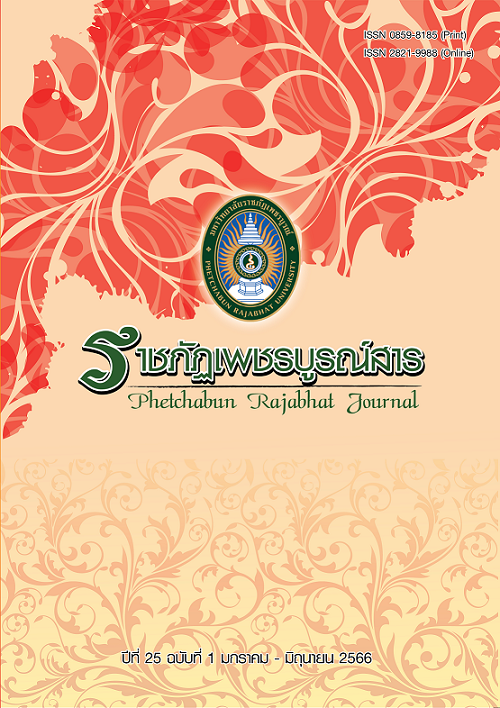แนวทางการสอนภาษาอังกฤษให้กับผู้เรียนเจเนอเรชันซี
Main Article Content
บทคัดย่อ
ผู้เรียนปัจจุบันเกิดในยุคที่เรียกว่าเจเนอเรชันซี (Generation Z) เป็นยุคที่โลกมีความก้าวหน้าทางเทคโนโลยี จึงเติบโตมาในสภาพแวดล้อมที่เทคโนโลยีเป็นสิ่งสำคัญในการดำเนินชีวิตประจำวัน ทำให้มีคุณลักษณะส่วนบุคคลและมีรูปแบบการเรียนที่แตกต่างจากผู้เรียนในรุ่นก่อน ๆ และส่งผลต่อการจัดการเรียนการสอนโดยเฉพาะอย่างยิ่งการสอนภาษาอังกฤษในฐานะภาษาต่างประเทศในประเทศไทย การสอนด้วยวิธีการแบบเดิมจึงอาจไม่เหมาะสมกับบริบทของผู้เรียนที่เปลี่ยนไป ครูจึงควรตระหนักในความสำคัญของประเด็นดังกล่าว และนำมาพิจารณาประกอบการออกแบบกระบวนการเรียนการสอน การให้ผู้เรียนทำกิจกรรมที่สอดคล้องกับความถนัด ความสามารถ และความสนใจจะทำให้บทเรียนมีความหมาย ช่วยพัฒนาศักยภาพทางภาษาสร้างแรงจูงใจในการเรียน ทำให้ผู้เรียนเห็นประโยชน์ของการเรียนภาษาอังกฤษ และนำไปสู่ความสำเร็จในการเรียนได้
บทความนี้จึงมีวัตถุประสงค์เพื่อแบ่งปันความรู้ให้แก่ครูสอนภาษาอังกฤษเกี่ยวกับผู้เรียนเจเนอเรชั่นซี ในด้านคุณลักษณะและรูปแบบการเรียน พร้อมทั้งนำเสนอแนวทางและตัวอย่างการนำความรู้ดังกล่าวมาประยุกต์ใช้ที่จะช่วยส่งเสริมให้การเรียนการสอนภาษาอังกฤษเป็นไปอย่างมีประสิทธิภาพ
Article Details

อนุญาตภายใต้เงื่อนไข Creative Commons Attribution-NonCommercial-NoDerivatives 4.0 International License.
เนื้อหาและข้อมูลในบทความที่ลงตีพิมพ์ในวารสาร ถือเป็นข้อคิดเห็นและความรับผิดชอบของผู้เขียนบทความโดยตรง ซึ่งกองบรรณาธิการวารสารไม่จำเป็นต้องเห็นด้วย หรือร่วมรับผิดชอบใด ๆ
เอกสารอ้างอิง
ดนุลดา จามจุรี. (2563). การออกแบบการเรียนรู้สำหรับผู้เรียน Gen Z. [ออนไลน์]. เข้าถึงได้จาก: http://www.curriculumandlearning.com/upload/Books/..Gen%20Z_1600319626.pdf. (วันที่ค้นข้อมูล: 1 ตุลาคม 2564).
ภัทราดา เอี่ยมบุญญฤทธิ์, ชลธิชา ภูริปาณิก และฐิติชัย รักบำรุง. (2563). การสอนอ่านเชิงวิเคราะห์ผ่านกระบวนการเรียนรู้แบบ Active Learning เพื่อพัฒนาทักษะการคิดวิเคราะห์ของเด็กไทยยุค Gen Z. วารสารศึกษาศาสตร์ มหาวิทยาลัยบูรพา, 31(3), 1-11.
สํานักงานคณะกรรมการการศึกษาขั้นพื้นฐาน. (2562). แนวทางการนิเทศเพื่อพัฒนาและส่งเสริมการจัดการเรียนรู้เชิงรุก (Active Learning) ตามนโยบายลดเวลาเรียน เพิ่มเวลารู้. [ออนไลน์]. เข้าถึงได้จาก: file:///C:/Users/edasmare/Desktop/active%20learning.pdf. (วันที่ค้นข้อมูล: 1 ตุลาคม 2564).
Alizadeh, M. (2016). The impact of motivation on English language learning. International Journal of Research in English Education, 1(1), 11–15.
Chalk. (2022). Teaching the next generation: How gen Z learns. [Online]. Available from: https://www.chalk.com/resources/teaching-the-next-generation-how-gen-z-learns/. (accessed: 22 November 2022).
Demir, B., and Sönmez, G. (2021). Generation Z students’ expectations from English language instruction. Journal of Language and Linguistic Studies, 17(Special Issue 1), 683-701.
Dolot, A. (2018). The characteristic of generation Z. E-mentor, 2(74), 44–50.
Eldridge, A. (2022). Generation Z demographic group. Encyclopedia Britannica. [Online]. Available from: https://www.britannica.com/topic/Generation-Z. (accessed: 20 November 2022).
Harmanto, B. (2013). Teaching English to generation Z students (New concept of young learners). [Online]. Available from: http://eprints.umpo.ac.id/id/eprint/1752. (accessed: 4 August 2022).
https://apps.apple.com. (2565). Speak & Practice Your English. [ออนไลน์]. https://apps.apple.com/us/app/speak-practice-your-english/id1511216085. (วันที่ค้นข้อมูล: 12 ธันวาคม 2565).
https://apps.apple.com. (2565). แอปพลิเคชัน duolingo. [ออนไลน์]. https://apps.apple.com/th/app/duolingo/id570060128?l=th. (วันที่ค้นข้อมูล: 12 ธันวาคม 2565).
https://apps.apple.com. (2565). แอปพลิเคชัน Johnny Grammar Word Challenge. [ออนไลน์]. https://apps.apple.com/us/app/johnny-grammar-word-challenge/id432488501. (วันที่ค้นข้อมูล: 12 ธันวาคม 2565).
https://play.google.com. (2565). แอปพลิเคชัน Cake - Learn English & Korean. [ออนไลน์]. https://play.google.com/store/apps/details?id=me.mycake&hl=en_US. (วันที่ค้นข้อมูล: 12 ธันวาคม 2565).
Kasimay, S. (2021). A case study: Exploration of generation Z students’ EFL learning environment in tertiary education. [Online]. Available from: http://acikerisim.baskent.edu.tr/bitstream/handle/11727/6607/10418457.pdf?sequence=1&isAllowed=y. (accessed: 1 December 2022).
Misiura, Y. Y. (2018). Teaching English to generation Z. [Online]. Available from: http://enpuir.npu.edu.ua/handle/123456789/23762. (accessed: 4 August 2022).
Mohr, K. A. J. and Mohr, E. S. (2017). Understanding generation Z students to promote a contemporary learning environment. Journal on Empowering Teaching Excellence, 1(9), article 9.
Nicolas, A J. (2020). Preferred learning methods of generation Z. [Online]. Available from: https://digitalcommons.salve.edu/fac_staff_pub/74. (accessed: 4 August 2022).
Purcell, K., Rainie, L., Heaps, A., Buchanan, J., Friedrich, L., Jacklin, A., Chen, C. and Zickuhr, K. (2012). How teens do research in the digital world. [Online]. Available from: http://www.pewinternet.org/wpcontent/uploads/sites/9/media/Files/Reports/2012/PIP_TeacherSurveyReportWithMethodology110112.pdf. (accessed: 10 August 2022).
Reilly, P. (2012). Understanding and teaching generation Y. English Teaching Forum, 50(1), 2-11.
Sriprom, C., Rungswang, A., Sukwitthayakul, C. and Chansri, N. (2019). Personality traits of Thai gen Z undergraduates: Challenges in the EFL classroom?. PASAA: Journal of Language Teaching and Learning, 57, 165-190.


